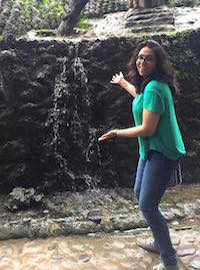I am a third year student, currently studying business, but with an interest in economics and policy as well. I have a keen interest in all things food-related, and hope to pursue a career combining my business knowledge with my love of food to develop mutually beneficial solutions in the agricultural and food production industries. On a personal level, I love travelling and experiencing new cultures, trying new foods, and reading fiction. My personal motto is to try everything once, twice if I like it, and a third time just to be sure.
Additional Information
What is your personal definition of sustainability?
Sustainability is the act of doing something today with the idea that it can continue to be done so, in the same way, indefinitely. I think sustainability involves respecting all aspects of a process, and reinvesting in them so that they can continue to be replenished – and this is true for natural, human, capital, and conceptual resources – regardless of the potential for financial gain.
What role do you see sustainability playing in your professional career?
I see sustainability being the backbone of my career, as something I want to incorporate into my work regardless of the role or the firm that I am a part of. I have a particular interest in environmental sustainability, so bringing practices that promote the mindful use of natural resources into the regular operations of conventional business is something I aim to do.
Looking more long-term, after hopefully learning more about developing sustainable practices within businesses, I would like to consult other organizations on the implementation of these practices as well. I believe that scarcity, resulting from overuse and overpopulation, will become one of the biggest issues society will face. Embracing sustainability is an opportunity for today’s corporations and those who do it successfully will have a great advantage in the future.
Ideally, I would like to work in marketing and development in the agriculture sector, working on ways to educate producers on sustainable farming methods while influencing consumers to demand sustainably-sourced food.
What sustainability projects have you been engaged in?
In high school, I was largely involved in environmental initiatives. I focused on local volunteerism with conservation organizations in the area. As I got more involved with business, however, I started to see that it was capable of being a much more impactful vehicle of change than any one individual actor. Once I began university, I became more involved with clubs, such as Net Impact and EnviroWestern, that tried to teach students to integrate sustainability into business models and focused on work that combined the two disciplines.
Last summer, I went on an internship to India where I worked for a microfinance firm, focusing more on the societal and economic sustainability that can be brought about by the development of small businesses. I had the opportunity to meet with women who were using microloans to change the conditions of the communities they were living in. This experience showed me that there was a lot of impact to be made by investing in human capital as the means to promote social sustainability.
This summer, I hope to continue this work and find ways to involve myself with local sustainable practices, learn more about sustainable supply chain management, and explore the opportunities available to me after graduation.
Alafiya Shabbir
